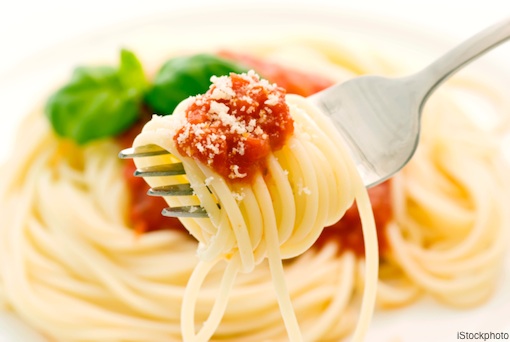The Marathon Diaries: How to Fuel Up (Right!) for Race Day

Sometimes I wonder if I started running because I found out about carbo-loading. I was all, “Wait … so the night before the race, I’m supposed to eat a big bowl of pasta? And garlic bread? And it’s good for me?” An Italian girl’s dream.
Unfortunately, this kind of pre-race fueling isn’t exactly the reality. Since my days as a newbie runner, I’ve realized that carbo-loading isn’t about stuffing yourself silly with spaghetti, and I’ve even figured out a few meals that I can eat that seem to enhance my performance without causing my stomach to get out of whack. But what if there’s more I can do?
I spoke with Drexel University professor and dietician Stella Volpe, who’s also a member of the President’s Council on Fitness, Sports and Nutrition Science Board, about the optimal eating habits for a marathoner. While everyone is different, she was able to give me some general guidelines that are helpful to the average athlete. Here, I pass along her nuggets of wisdom to you.
Is there an easy formula for figuring out how many calories one should consume in a day? Or, even better, to determine how many calories a runner needs to add during marathon training?
For a “quick” calculation, use these three equations: First, take your body weight in pounds and multiply it by 10. Then, take the product of the first equation and multiply it by 0.10. Finally, take the product of the first equation again and multiply it by a factor that parallels your energy expenditure. For you, because you’re training for a marathon, I will guess about 75 percent, so 0.75 x body weight. Then, add the products of all three equations up.
An example: For a 150-pound person, the math would look like this:
150 pounds x 10 = 1500 (This represents, crudely, your resting or basal metabolic rate—the energy, or calories, you need to stay alive at rest.)
1500 x 0.10 = 150
1500 x 0.75 = 1125
TOTAL = 2775 calories per day needed
Everyone talks about carbo-loading and protein, but are there essential vitamins/minerals/nutrients that get overlooked by runners that we should pay closer attention to?
Oftentimes for women, iron, zinc and calcium tend to be overlooked. All vitamins and minerals are important for so many metabolic functions in your body. So it’s important to get these nutrients for your health and your performance.
You do not necessarily need to supplement if you are consuming the right amount of calories and have a varied diet that includes fruits, vegetables and whole grains. Vitamin C has been shown to help be protective of upper-respiratory tract infections that runners sometimes get, especially if they train in the city. So including an orange or two a day, or other foods high in vitamin C, will also be helpful for your training.
What would you say is the ideal pre-race dinner and pre-race breakfast?
It depends on the person and the race, but ideally the night before, the person should consume a higher amount of complex carbohydrates, but there should be protein with that meal, as well. Something like pasta, with tuna and either a red sauce or olive oil with some tomatoes would be good. Hydrate well at that meal and through the evening. Have something like yogurt and nuts with water as a snack before bed.
For breakfast, it depends on the time of the race. Three hours before the start time, eat pancakes with some protein as a side, a sports drink, and a banana. You want to keep fiber lower the day of the race to prevent bloating and diarrhea.
Then, maybe an hour out from start time, have some water and sports gel or a sports drink, and perhaps some of a protein/carbohydrate bar. I do well with like Clif bars before I compete. Just be sure to new things and experiment with your diet during practice, not on race day!
Recovery is key. While most of us want a cheesesteak and beer as a reward after the race, what do we really need to eat to ensure a speedy recovery?
The first two hours post-exercise and competition are the most important. Chocolate milk is one of the best recovery drinks. I like to consume that after a workout or competition. Then, you want to consume a meal, mostly carbohydrates, to replenish your glycogen stores (the stores of carbohydrates in your body).
If you could only give runners one bit of advice while they are training for a marathon, what would it be?
Train hard (be sure to include weight training in your training plan!), recover well, and ensure that good nutrition is a part of your training. Nutrition can help a person do much better in a race than they perceive, and winning a race or PRing can be decided in a second. So if you train well and eat well, that one-second faster could be yours!
>> Tell us: How do you fuel up for a long run or big race? What are your best tricks and tips? Share in the comments!
…………
Annie Acri is an administrative assistant at the Drexel University College of Medicine and is working toward her master’s of communication degree. The 2012 Philadelphia Marathon will be her second marathon. Follow along every Tuesday as Annie posts about the ups and downs of training as she prepares for the big race on November 18th. Catch up on the series here.


